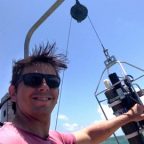Coral reef fisheries are critical for supporting subsistence and artisanal fishers through the Pacific Island Countries and Territories (PICTs), but are increasingly impacted by land-based pollution, changing fishing practices, and habitat degradation. Research is thus needed to provide regionally-representative information on changes in fisheries and pollution exposure, to incorporate Traditional Ecological Knowledge (TEK) of isheries into management recommendations, and to build capacity and support conservation efforts. This project will take place in four geographically diverse PICTs – Fiji, Tonga, Tuvalu, Vanuatu – and has four distinct objectives: (i) build capacity in PICTs, (ii) establish a regional baseline for microplastics (MP) in reef-associated food fishes, (iii) document TEK around reef-associated food fishes and pollution using social science methodologies, and (iv) inform national and regional conservation efforts. The project focuses on ten important reef-associated food fishes identified by in-country stakeholders, with representation of species across trophic and functional groups. Via the co-production of research and knowledge with in-country partners, this project will provide a much-needed regional baseline of MP contamination in common food fishes (indicating risk to human health/nutrition), while the TEK will identify preferences and catch trends, and yield key biological information that can inform management tools addressing food security.
Project • CRRP2022-05MY-Ford













